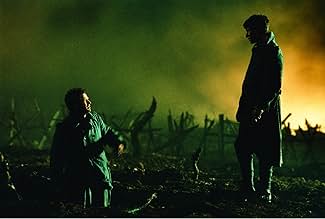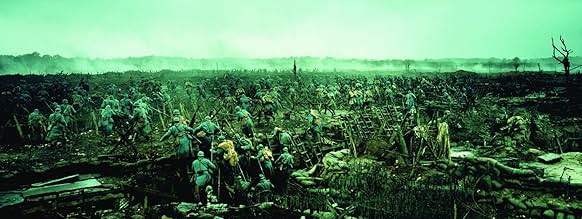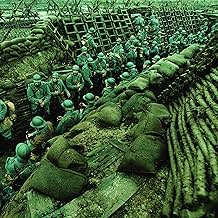VALUTAZIONE IMDb
7,6/10
77.113
LA TUA VALUTAZIONE
Una giovane tenta disperatamente di trovare il fidanzato scomparso nella regione della Somme durante la prima guerra mondiale.Una giovane tenta disperatamente di trovare il fidanzato scomparso nella regione della Somme durante la prima guerra mondiale.Una giovane tenta disperatamente di trovare il fidanzato scomparso nella regione della Somme durante la prima guerra mondiale.
- Regia
- Sceneggiatura
- Star
- Candidato a 2 Oscar
- 17 vittorie e 35 candidature totali
Jean-Pierre Darroussin
- Benjamin Gordes
- (as Jean Pierre Darroussin)
Jean-Pierre Becker
- Esperanza
- (as Jean Pierre Becker)
Jean-Paul Rouve
- Le facteur
- (as Jean Paul Rouve)
Elina Löwensohn
- La femme allemande
- (as Elina Lowensohn)
Recensioni in evidenza
10lawprof
Director Jean-Pierre Jeunet in the hit, "Amelie," employed scintillating Audrey Tatou, the most expressive young French actress in film today, to portray a whimsical and charming girl-woman in search of love. With her now as a young French rural ingénue searching for years after The Great War (aka World War I or, even better, The War to End All Wars) for a probably killed fiancé, Jeunet crafted a moving, often penetrating story centering on the charnel carnage of trench warfare.
Lame as a single-digit-age child because of polio and living with relatives who took over after her parents were killed in an accident, Mathilde is befriended by Manech (Gasparad Ulliel). Mathilde, a loner separated from her peers by her disability, and Manech become closest friends. Late adolescence brings love and lust, commitment and an engagement.
But in 1917 the French Army needed fresh meat for the bloody maw that was warfare on the almost terminally static Western Front. And off went Manech along with many others who never returned.
Employing the harshest discipline of any Western army in modern history, the French Army (which gave the world the Dreyfus trial and in World War I actually used decimation to punish mutinous regiments and divisions) sentences Manech and four others to be cast into No Man's Land without weapons, without any possibility of being allowed to return but with the macabre requirement that they respond to morning roll call if alive (not a good bet). Their alleged crime was self-mutilation to get out of combat (what we call in the American military, "SIW," Self-Inflicted Wounds).
Mathilde in 1920, steely faithful in a moving and believable way, searches fervently for her fiancé whom she believes "must" be alive somewhere, somehow. Employing artful stratagems and enlisting the willing, the paid and the dragooned, her search takes her to cities and battlefields. With resort to a child's employment of magical thinking she frequently whispers tests about what will happen in immediate, ordinary circumstances with one result "proving" for her that Manech is still alive. Tatou makes this self-deception appealing and infinitely sad.
As Spielberg did in "Saving Private Ryan," Jeunet brings the immediacy of the meat-grinding battlefield to the viewer over and over again through superb if sometimes difficult to watch cinematography. Of course no film truly captures the desperation, the epidemic fatality that gripped and demoralized the French Army after years of immobile, set-piece fighting. One needs to read Robert Graves or Siegfried Sassoon for that. But Jeunet has brought to the screen the most realistic World War I trench scenes since "All Quiet on the Western Front" (the 1930 original, of course).
Tatou is an acting tsunami here, alternately beguiling and tense and always hopeful while fighting despair. Expect to see her in many fine roles in the future. She's marvelous.
The entire cast is excellent-few are known in the U.S.
A remarkable movie with an ending that will satisfy and disturb at the same time.
Tatou and Jeunet deserve Oscar nominations.
10/10
Lame as a single-digit-age child because of polio and living with relatives who took over after her parents were killed in an accident, Mathilde is befriended by Manech (Gasparad Ulliel). Mathilde, a loner separated from her peers by her disability, and Manech become closest friends. Late adolescence brings love and lust, commitment and an engagement.
But in 1917 the French Army needed fresh meat for the bloody maw that was warfare on the almost terminally static Western Front. And off went Manech along with many others who never returned.
Employing the harshest discipline of any Western army in modern history, the French Army (which gave the world the Dreyfus trial and in World War I actually used decimation to punish mutinous regiments and divisions) sentences Manech and four others to be cast into No Man's Land without weapons, without any possibility of being allowed to return but with the macabre requirement that they respond to morning roll call if alive (not a good bet). Their alleged crime was self-mutilation to get out of combat (what we call in the American military, "SIW," Self-Inflicted Wounds).
Mathilde in 1920, steely faithful in a moving and believable way, searches fervently for her fiancé whom she believes "must" be alive somewhere, somehow. Employing artful stratagems and enlisting the willing, the paid and the dragooned, her search takes her to cities and battlefields. With resort to a child's employment of magical thinking she frequently whispers tests about what will happen in immediate, ordinary circumstances with one result "proving" for her that Manech is still alive. Tatou makes this self-deception appealing and infinitely sad.
As Spielberg did in "Saving Private Ryan," Jeunet brings the immediacy of the meat-grinding battlefield to the viewer over and over again through superb if sometimes difficult to watch cinematography. Of course no film truly captures the desperation, the epidemic fatality that gripped and demoralized the French Army after years of immobile, set-piece fighting. One needs to read Robert Graves or Siegfried Sassoon for that. But Jeunet has brought to the screen the most realistic World War I trench scenes since "All Quiet on the Western Front" (the 1930 original, of course).
Tatou is an acting tsunami here, alternately beguiling and tense and always hopeful while fighting despair. Expect to see her in many fine roles in the future. She's marvelous.
The entire cast is excellent-few are known in the U.S.
A remarkable movie with an ending that will satisfy and disturb at the same time.
Tatou and Jeunet deserve Oscar nominations.
10/10
10gort-8
This is one of those times that a rating system breaks down. I gave this film a "10" only because there were no "20's" available.
This film, in its own way, seems to be able to fire on those same diverse cylinders that William Shakespeare so often did. It's a light and airy comedy. It's the bitterest of tragedies. It's a beautiful romance. It's an unfolding mystery. At it's heart it is a film of war. War, in all its boiling chaos, touches on all those experiences and more.
When I left the theater I was both elated and depressed. My elation came from having just had such a pure cinematic experience. My depression came from glancing at the marquee and reminding myself that I'll have to survive on the sort of cinema half-life provided by the pablum that normally makes it to the screen. Every now and again it's great to be reminded just how good a movie can be.
This film, in its own way, seems to be able to fire on those same diverse cylinders that William Shakespeare so often did. It's a light and airy comedy. It's the bitterest of tragedies. It's a beautiful romance. It's an unfolding mystery. At it's heart it is a film of war. War, in all its boiling chaos, touches on all those experiences and more.
When I left the theater I was both elated and depressed. My elation came from having just had such a pure cinematic experience. My depression came from glancing at the marquee and reminding myself that I'll have to survive on the sort of cinema half-life provided by the pablum that normally makes it to the screen. Every now and again it's great to be reminded just how good a movie can be.
Lovely Audrey Tautou and director Jean-Pierre Jeunet reteam (having previously made the delightful comedy Amelie) in the epic war drama, A Very Long Engagement, based on the novel by Sebastien Japrisot. It is a visual powerhouse of a film that defies conventional genres by melding together different themes and injecting a generous dose of period authenticity. This French language film is an emotional odyssey that keeps you guessing while it never loses sight of its humanity and even humor.
Childhood friends and then lovers, Mathilde (Tatout) and Manech (Gaspard Ulliel) are separated when duty calls in World War One France. War is hell and the trench fighting that will claim countless lives begins to take its toll on men's sanity and tolerance. Manech becomes one of five soldiers arrested for cowardice because each has a self inflicted hand wound to evade the deadly fighting. But instead of execution by firing squad, the condemned men are forced into no man's land to be fodder for the German line.
It is almost certain that all the prisoners died that day, but years later, in 1920, Mathilde continues in her quest to find the truth and her lover. Aided by her aunt and uncle, she enlists the help of an investigative agency and lawyer to track down the people who knew Manech. Slowly the list grows and one clue connects with another as more witnesses emerge. What starts out as a somber war romance develops into a fascinating adventure of love and mystery of fate as Mathilde follows the trail. Sure, she does get frustrated as a couple of clues are dead ends, but when a connection is established, the story leaps forward. At times the help comes from an unexpected source and at other times, sheer coincidence saves the day. There is even a subplot involving treachery and betrayal. Before long, the audience will become caught up in her journey. Is Manech alive and will Mathilde ever find him? The film's structure weaves back and forth through flashbacks with great ease and clarity. An occasional voice over narration ties up the loose ends. As the plot begins to make more sense, key scenes are retold from different viewpoints in the Rashomon style of storytelling. The battle scenes, quite grim and realistic (Saving Private Ryan type of action), are light years ahead of Paths of Glory's anthill scenes, although the opening march through the trenches is almost identical to Kubrick's 1957 classic. There is even a hint of the older favorite, Random Harvest, which also dealt with a wartime romance and search.
A Very Long Engagement is blessed with a strong ensemble cast although it may require a score card to keep track of all the names. Andrey Tautou is quite good as the anxious searcher. Her beauty never detracts from her acting talent. Gaspard Ulliel reminds one of a young Ethan Hawke in his innocence amid difficult circumstances. As the wife of a key character, Jodie Foster is effective as she corresponds with Mathilde. Yes, Jodie does the French thing well, but her appearance is a bit jarring. Dominique Pinon, a favorite of Jeunet's (Alien: Resurrection, Amelie), lends good support as the uncle. Even the smaller roles are well rounded and memorable, a testament to good casting, strong writing, and Jeunet's direction.
This big budget film is lengthy, but it does have the sweep of a big time novel. The production is outstanding in the authentic costumes and historic set designs of 1920. Jeunet employs cinematography and computer graphics effectively to recreate the era magnificently. He has always been a marvelous director of eye candy, and the film is wonderful to look at. Angelo Badalamenti who has spent a lot of time scoring the moody thrillers for David Lynch is allowed to flourish here with a lushly romantic, emotional soundtrack.
Doubtless this is very likely the ultimate French tearjerker, a kind of Gone with the Wind meets Cold Mountain type of film. It serves as a commentary on war, a romantic fable, a revenge tale, and an intricate mystery. It is a film that defies pigeonholing and that's part of the fun. It also has well defined characters and nice touches of detail and exposition. In short, it is one powerful movie to close out 2004.
***1/2 stars out of ****
Childhood friends and then lovers, Mathilde (Tatout) and Manech (Gaspard Ulliel) are separated when duty calls in World War One France. War is hell and the trench fighting that will claim countless lives begins to take its toll on men's sanity and tolerance. Manech becomes one of five soldiers arrested for cowardice because each has a self inflicted hand wound to evade the deadly fighting. But instead of execution by firing squad, the condemned men are forced into no man's land to be fodder for the German line.
It is almost certain that all the prisoners died that day, but years later, in 1920, Mathilde continues in her quest to find the truth and her lover. Aided by her aunt and uncle, she enlists the help of an investigative agency and lawyer to track down the people who knew Manech. Slowly the list grows and one clue connects with another as more witnesses emerge. What starts out as a somber war romance develops into a fascinating adventure of love and mystery of fate as Mathilde follows the trail. Sure, she does get frustrated as a couple of clues are dead ends, but when a connection is established, the story leaps forward. At times the help comes from an unexpected source and at other times, sheer coincidence saves the day. There is even a subplot involving treachery and betrayal. Before long, the audience will become caught up in her journey. Is Manech alive and will Mathilde ever find him? The film's structure weaves back and forth through flashbacks with great ease and clarity. An occasional voice over narration ties up the loose ends. As the plot begins to make more sense, key scenes are retold from different viewpoints in the Rashomon style of storytelling. The battle scenes, quite grim and realistic (Saving Private Ryan type of action), are light years ahead of Paths of Glory's anthill scenes, although the opening march through the trenches is almost identical to Kubrick's 1957 classic. There is even a hint of the older favorite, Random Harvest, which also dealt with a wartime romance and search.
A Very Long Engagement is blessed with a strong ensemble cast although it may require a score card to keep track of all the names. Andrey Tautou is quite good as the anxious searcher. Her beauty never detracts from her acting talent. Gaspard Ulliel reminds one of a young Ethan Hawke in his innocence amid difficult circumstances. As the wife of a key character, Jodie Foster is effective as she corresponds with Mathilde. Yes, Jodie does the French thing well, but her appearance is a bit jarring. Dominique Pinon, a favorite of Jeunet's (Alien: Resurrection, Amelie), lends good support as the uncle. Even the smaller roles are well rounded and memorable, a testament to good casting, strong writing, and Jeunet's direction.
This big budget film is lengthy, but it does have the sweep of a big time novel. The production is outstanding in the authentic costumes and historic set designs of 1920. Jeunet employs cinematography and computer graphics effectively to recreate the era magnificently. He has always been a marvelous director of eye candy, and the film is wonderful to look at. Angelo Badalamenti who has spent a lot of time scoring the moody thrillers for David Lynch is allowed to flourish here with a lushly romantic, emotional soundtrack.
Doubtless this is very likely the ultimate French tearjerker, a kind of Gone with the Wind meets Cold Mountain type of film. It serves as a commentary on war, a romantic fable, a revenge tale, and an intricate mystery. It is a film that defies pigeonholing and that's part of the fun. It also has well defined characters and nice touches of detail and exposition. In short, it is one powerful movie to close out 2004.
***1/2 stars out of ****
10Libs
It is almost insulting to compare this film to Amelie Poulain. Yes it's the same crew, yes it's the same director and yes, Audrey Tautou almost plays the same character. But give JP Jeunet a break, it's part of HIS style. Would you blame Beethoven because his symphonies kinda sounded the same?
It is at times gritty, with its very tough depictions of the Great War, and at times light and naive. It all follows a very complicated storyline which is, I would have to admit, the only weakness in this otherwise perfect movie. With so many characters and so many plot elements, some people may feel a bit lost, specially toward the end. But this is of lesser concern as the audience will still follow the main idea : a quest to find a loved one. So even through all the intricacies of the subplots, the arc story (and its finale) always remain on the horizon.
To put it short, the movie is a masterpiece. The acting is strong, the scenes are breathtaking and overall, so much attention has been put to details that it feels like a labor of love more than a big production movie. I truly think that if French cinema was not so locked into producing crappy talkative movies about losers and failures, it could come up with a lot more movies as poignant as Engagement is.
It is at times gritty, with its very tough depictions of the Great War, and at times light and naive. It all follows a very complicated storyline which is, I would have to admit, the only weakness in this otherwise perfect movie. With so many characters and so many plot elements, some people may feel a bit lost, specially toward the end. But this is of lesser concern as the audience will still follow the main idea : a quest to find a loved one. So even through all the intricacies of the subplots, the arc story (and its finale) always remain on the horizon.
To put it short, the movie is a masterpiece. The acting is strong, the scenes are breathtaking and overall, so much attention has been put to details that it feels like a labor of love more than a big production movie. I truly think that if French cinema was not so locked into producing crappy talkative movies about losers and failures, it could come up with a lot more movies as poignant as Engagement is.
A powerful and emotional war drama from French auteur Jean-Pierre Jeunet. Audrey Tautou leads us through an engaging and well-crafted story which sweeps us into the world of its characters, whom are established and well developed as the story progresses. The film itself is visually arresting with stunning cinematography. It was actually Bruno Delbonnel's visuals that acted as one of the man aspects that allured my interest in the film, it's a visual powerhouse blending the gritty conventions of war with scenes of a more romantic and dramatic style. A harrowing and emotional account of World War I from the perspective of French soldiers and civilians.
Lo sapevi?
- QuizWhen casting Jodie Foster, Jean-Pierre Jeunet met her in Paris at the café which was used to shoot the scenes in Il favoloso mondo di Amélie (2001) which is near where he lives. Some tourists were at the café, knowing it was featured in the film, asked Jeunet and Foster to move out of the way (not recognizing them) so that they could take a photograph of the café.
- BlooperIn the film there is an important storyline about an albatross. However, throughout the film in all footage depicting the albatross a gannet is shown. Though a gannet is also a large seabird, it looks nothing like an albatross.
- Citazioni
Ange Bassignano: [writes] "Revenge is pointless. Try to be happy and don't ruin your life for me."
- ConnessioniEdited from Il popolo migratore (2001)
- Colonne sonoreÇa ne Vaut pas l'Amour
Music by François Perpignan
Lyrics by Alexandre Trébitsch
Performed by Esther Lekain
I più visti
Accedi per valutare e creare un elenco di titoli salvati per ottenere consigli personalizzati
- How long is A Very Long Engagement?Powered by Alexa
Dettagli
- Data di uscita
- Paesi di origine
- Lingue
- Celebre anche come
- A Very Long Engagement
- Luoghi delle riprese
- Héaux de Bréhat, Côtes-d'Armor, Francia(lighthouse exteriors)
- Aziende produttrici
- Vedi altri crediti dell’azienda su IMDbPro
Botteghino
- Budget
- 56.600.000 USD (previsto)
- Lordo Stati Uniti e Canada
- 6.524.389 USD
- Fine settimana di apertura Stati Uniti e Canada
- 101.749 USD
- 28 nov 2004
- Lordo in tutto il mondo
- 69.424.389 USD
- Tempo di esecuzione2 ore 13 minuti
- Colore
- Mix di suoni
- Proporzioni
- 2.35 : 1
Contribuisci a questa pagina
Suggerisci una modifica o aggiungi i contenuti mancanti

Divario superiore
What is the Japanese language plot outline for Una lunga domenica di passioni (2004)?
Rispondi




































